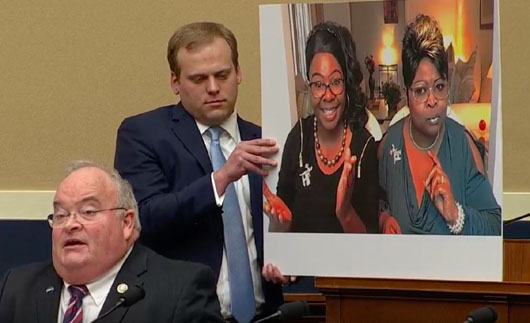by WorldTribune Staff, April 13, 2018
Republicans on the House Energy and Commerce Committee grilled Facebook CEO Mark Zuckerberg over the platform’s alleged hostility toward conservative viewpoints.
One Republican during the April 11 meeting, Rep. Billy Long of Missouri, warned Zuckerberg that Congress was “getting ready to overreact” with regulation.

“I would suggest you go home and review all these other things people have accused you of today,” Long said. “You’re the guy to fix this, we’re not. You need to save your ship.”
Much of the criticism aimed at Zuckerberg regarded Facebook’s censoring of pro-Trump vloggers Diamond and Silk – Lynnette “Diamond” Hardaway and Rochelle “Silk” Richardson.
Facebook had told the vloggers their videos were “unsafe to the community.”
Rep. Joe Barton, Texas Republican, started his questioning by reading off a query he said he received through Facebook, saying he had “dozens” of similar ones. “Please ask Mr. Zuckerberg, why is Facebook censoring conservative bloggers such as Diamond and Silk? Facebook called them ‘unsafe to the community.’ That is ludicrous. They hold conservative views. That isn’t unsafe.”
Zuckerberg said that “in that specific case, our team made an enforcement error, and we have already gotten in touch with them to reverse it.”
Rep. Marsha Blackburn, Tennessee Republican, asked whether Facebook manipulated algorithms to censor speech and became alarmed when Zuckerberg mentioned how Facebook automatically finds and bans terrorist content. “Let me tell you something right now. Diamond and Silk is not terrorism,” Blackburn said.
Long also held up a poster board with the vloggers’ photo on it, asking Zuckerberg to identify them. “Diamond and Silk have a question for you, and that question is: what is unsafe about two black women supporting President Donald J. Trump?”
Zuckerberg reiterated that “nothing is unsafe about that,” but Long castigated him for not being (in Zuckerberg’s words) “up to speed” on the issue.”
In 2016, several former Facebook “news curators” told Gizmodo that Facebook workers routinely suppressed news stories of interest to conservative readers from the social network’s influential “trending” news section.
Zuckerberg denied these claims, posting: “We have rigorous guidelines that do not permit the prioritization of one viewpoint over another or the suppression of political perspectives…We have found no evidence that this [Gizmodo] report is true.”
Meanwhile, at the April 11 hearing, New Mexico Rep. Ben Lujan asked Zuckerberg about so-called “shadow profiles” – the term often used to refer to the data that Facebook collects on non-users and other hidden data that Facebook holds but does not offer openly on the site for users to see.
Lujan asked: “Facebook has detailed profiles on people who have never signed up for Facebook, yes or no?”
Zuckerberg responded: “Congressman, in general we collect data on people who have not signed up for Facebook for security purposes to prevent the kind of scraping you were just referring to [reverse searches based on public info like phone numbers].”
Lujan: “It’s been admitted by Facebook that you do collect data points on non-[Facebook users]. My question is, can someone who does not have a Facebook account opt out of Facebook’s involuntary data collection?”
Zuckerberg: “Anyone can turn off and opt out of any data collection for ads, whether they use our services or not, but in order to prevent people from scraping public information… we need to know when someone is repeatedly trying to access our services.”
Lujan concluded by saying: “It may surprise you that we’ve not talked about this a lot today. You’ve said everyone controls their data, but you’re collecting data on people who are not even Facebook users who have never signed a consent, a privacy agreement. And it may surprise you that on Facebook’s page when you go to ‘I don’t have a Facebook account and would like to request all my personal data stored by Facebook’ it takes you to a form that says ‘go to your Facebook page and then on your account settings you can download your data.’ So you’re directing people that don’t even have a Facebook page to sign up for a Facebook page to access their data… We’ve got to change that.”
TechCrunch’s Natasha Lomas explained during a 2013 Facebook privacy scandal: Chances are someone you have corresponded with – by email or mobile phone – has let Facebook’s data spiders crawl through their correspondence, thereby allowing your contact data to be assimilated entirely without your knowledge or consent.”
TechCrunch noted that, “during that privacy breach, Facebook exposed the email addresses and phone numbers of six million users, though it later became apparent that a chunk of those accounts were never handed over to the platform directly by Facebook users. This information can be drawn into Facebook’s vast data aggregation machine through friends or friends of friends via all kinds of channels, including the ‘find friends’ feature that allows the app to scan mobile contacts.”
Subscribe to Geostrategy-Direct __________ Support Free Press Foundation
